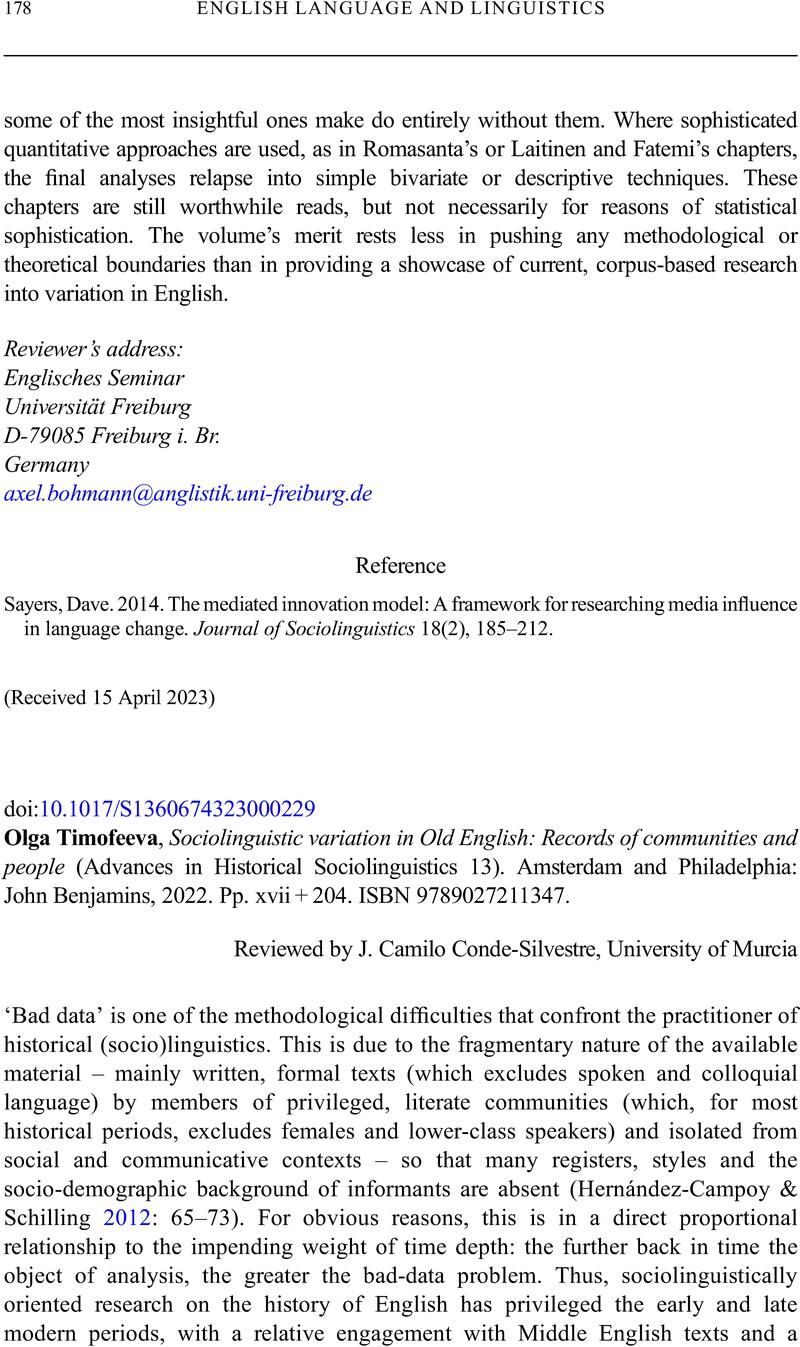No CrossRef data available.
Article contents
Olga Timofeeva, Sociolinguistic variation in Old English: Records of communities and people (Advances in Historical Sociolinguistics 13). Amsterdam and Philadelphia: John Benjamins, 2022. Pp. xvii + 204. ISBN 9789027211347.
Review products
Olga Timofeeva, Sociolinguistic variation in Old English: Records of communities and people (Advances in Historical Sociolinguistics 13). Amsterdam and Philadelphia: John Benjamins, 2022. Pp. xvii + 204. ISBN 9789027211347.
Published online by Cambridge University Press: 23 May 2023
Abstract
An abstract is not available for this content so a preview has been provided. Please use the Get access link above for information on how to access this content.

- Type
- Book Review
- Information
- Copyright
- Copyright © The Author(s), 2023. Published by Cambridge University Press
References
Eckert, Penelope. 2012. Three waves of variation study: The emergence of meaning in the study of variation. Annual Review of Anthropology 41, 87–100.Google Scholar
Hernández-Campoy, Juan M. & Schilling, Natalie. 2012. The application of the quantitative paradigm to historical sociolinguistics: Problems with the generalizability principle. In Hernández-Campoy, Juan M. & Camilo Conde-Silvestre, J. (eds.), The handbook of historical sociolinguistics, 63‒79. Malden, MA: Wiley Blackwell.Google Scholar
Janda, Richard D. & Joseph, Brian D.. 2003. On language, change, and language change ‒ Or, of history, linguistics, and historical linguistics. In Joseph, Brian D. & Janda, Richard D. (eds.), The handbook of historical linguistics, 3‒180. Malden, MA: Wiley Blackwell.Google Scholar
Lenker, Ursula. 2000. The monasteries of the Benedictine Reform and the ‘Winchester School’: Model cases of social networks in Anglo-Saxon England? European Journal of English Studies 4, 225‒38.CrossRefGoogle Scholar
Poplack, Shana. 2018. Borrowing: Loanwords in the speech community and in the grammar. New York: Oxford University Press.Google Scholar
Sawyer, Peter Hayes. 1968. Anglo-Saxon charters: An annotated list and bibliography. London: Offices of the Royal Historical Society.Google Scholar
Timofeeva, Olga. 2013. Of ledenum bocum to engliscum gereorde: Bilingual communities of practice in Anglo-Saxon England. In Kopaczyk, Joanna & Jucker, Andreas H. (eds.), Communities of practice in the history of English, 201‒24. Amsterdam: John Benjamins.Google Scholar
Toon, Thomas E. 1983. The politics of early Old English sound change. London: Academic Press.Google Scholar
Wright, Laura. 1994. Early Modern London business English. In Kastovsky, Dieter (ed.), Studies in Early Modern English, 449‒65. Berlin: Mouton de Gruyter.Google Scholar
Wright, Laura. 2000. Bills, accounts, inventories: Everyday trilingual activities in the business world of later medieval England. In Trotter, David A. (ed.), Multilingualism in later medieval Britain, 149‒56. Woodbridge: D. S. Brewer.Google Scholar





